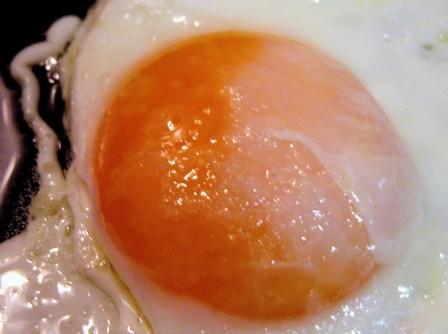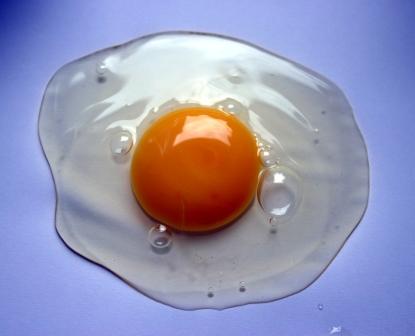
Eggs are composed of a translucent white and a yellow yolk and surrounded by a protective shell. The shell can be white or brown, depending on the fowl and its breed, but the color of the shell is not related to the nutritional value or the quality of the egg itself. Eggs have a unique food chemistry that allows them to help in foaming, coagulation, browning, and emulsification. They are whole foods and pre-packaged with protein, fat, carbohydrates, and micronutrients as these are needed for the nourishment of a developing chick.
There are three kinds of chicken eggs that are available in the market nowadays. The first one is the organic egg produced by chicken that have not been treated with any hormones or antibiotics. The second kind is the omega-3 eggs that are produced by chickens fed with a diet rich in omega-3 fatty acids. The third kind would be the brown eggs produced by a special breed of chickens. There are also duck, quail, and goose eggs available in the market though these eggs are not that popular as chicken eggs.
If you want low-cost but high-quality protein, then eggs are what you are looking for. One egg can provide you with 11.1% of the recommended daily value of protein. Aside from this, eggs also have other health benefits and these include:
Brain Health Boost. Eggs are rich sources of choline which is a key component of many fat-containing structures in our cell membranes and the body needs it in good supply to maintain good health. The human body can produce choline but only in inadequate supplies that’s why we need to source it out in foods like eggs.
Phosphatidylcholine and sphingomyelin are fat-like molecules that account for a high percentage of the human brain’s total mass, of which choline is a main component, that is why it is important for brain function and health. Moreover, choline is also a very important molecule in methylation, a cellular process that makes various chemical events in the body possible. It is also a key component of acetylcholine, a neurotransmitter that carries messages to and from the nerves.
Fight Inflammation. The anti-inflammatory benefits of egg are due mostly to its choline component. The egg yolk is the richest source of choline among all other food stuffs. Working together with betaine, choline helps lower inflammation. People whose diet consists of high levels of choline have inflammatory marker levels of at least 20% lower than people with low choline intake. Chronic inflammation markers have been associated with a wide range of conditions like osteoporosis, heart disease, type 2 diabetes, Alzheimer’s diseases, and cognitive decline.

Promote Weight Loss. An egg breakfast can help you lose some weight. In a study, the subjects were divided into groups and the first group ate breakfast including two eggs while the other group consumed bagel over a period of time. The same amount of calories and weight mass are given by the two different breakfasts.
The group which had eggs included in their breakfast lost almost twice as much weight than the bagel eaters. They also experienced 83% greater decrease in waist circumference as compared to the second group. Moreover, the egg eaters reported greater improvements in their energy levels.
Heart Health. Choline, a molecule which eggs are rich in, have a significant impact on cardiovascular health. This is because choline is one of the B vitamins responsible for converting homocysteine, a molecule that can damage your blood vessels, into other safe molecules.
There are people who are wary of eating eggs because they are known to be high in cholesterol. The yolk contains all the cholesterol that can be found in an egg. Despite this issue on cholesterol, there are nutritional experts who posit that eating one or two eggs a day will not make any measurable changes in your blood cholesterol levels as long as you are on a low fat diet. This is supported by studies that found out that it is not dietary cholesterol but saturated fat in the diet that influences blood cholesterol levels the most.
Improve Cholesterol Profile. As above-mentioned, eggs do not significantly affect the levels of cholesterol in most people. Aside from this, there are also recent studies suggesting that if you want to see significant improvement in your blood lipids or cholesterols, you should eat whole eggs. This is true even for people who experience a rise in their cholesterol levels when they eat foods that are rich in cholesterol.
Prevent Blood Clots. Blood clots often lead to stroke or heart attack and eating eggs may help you lower your risk for them. This is because the proteins that are present in the egg yolk can potently inhibit human platelet aggregation and can prolong the time it takes for fibrinogen to be converted into fibrin. Fibrinogen is a protein found in blood while fibrin serves as the scaffolding in which clumps of white and red blood cells are deposited to form the much dreaded blood clot. The proteins found in eggs inhibit clot formation and that the more egg yolks you eat, the more protein to help prevent blood clot formation.
Protect Eyesight. The carotenoid lutein, which is said to help prevent cataracts and age-related macular degenerations, is in abundant supply in eggs. The lutein found in eggs is even higher than that found in spinach and other green vegetables. Lutein from egg yolks is also best absorbed by human body compared to spinach and other lutein supplements. Eggs are also more available and way cheaper than commercially-prepared lutein supplements.
Aside from lutein, eggs are also rich in zeaxanthin, another vision-protective carotenoid. Even if eggs can help boost the levels of both lutein and zeaxanthin in the blood and reduce the risk of age-related maculae damage, you will not experience significant increase in your cholesterol or triglyceride levels.

Aside from the classification of eggs according to sizes, there are countries that classify eggs according to quality. Whatever classifications of egg are available to you, the basic thing here is to buy fresh eggs so that you can enjoy the most health benefits that they give. When you buy eggs, do not buy those with cracks or breaks and buy only from a reliable seller. It would also be wise to keep eggs refrigerated so they will still stay fresh. It is also advised not to wash them because the washing process can remove their protective coating. When storing them, keep the pointed ends facing downwards in order to prevent the yolk and the air chamber from being displaced.
Hope this has been of some help,
Ray Baker

